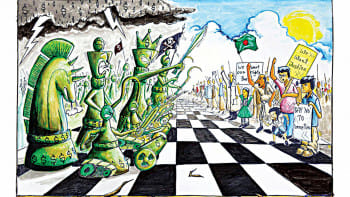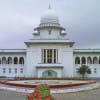Anti-graft drive: How has Awami League fared in first six months?

The Awami League-led government completes six months of its fourth consecutive term in office today. Generally, six months is not enough time to assess the performance of a government. But for an incumbent government in seat since 2009, whose comeback was accompanied with many promises, it seems a good enough timeframe to evaluate its deeds over the last six months in the context of its 15-year rule.
In the past six months, the issue of corruption has truly come to the fore, and the government has acted in a handful of high-profile cases. Prime Minister Sheikh Hasina recently vowed that no one indulging in corruption will be spared, irrespective of their identity, and that the ongoing drive against graft will continue. At the maiden cabinet meeting on January 15, she also gave strict instructions to not tolerate corruption and irregularity.
However, there are as yet no indications that the government is ready to tackle corruption holistically. No policy reforms have been suggested, no directives have been issued to concerned agencies, nor have law enforcement authorities been bolstered to act against those deemed corrupt. Instead, what seems to be clearer as days go by is that the government is cherry-picking certain individuals who may no longer be in favour, and conducting isolated drives against them, while others go scot-free.
The Anti-Corruption Commission is currently investigating the accumulation of illegal wealth by former inspector general of police Benazir Ahmed and his family members, former National Board of Revenue (NBR) official Matiur Rahman, immediate past NBR first secretary Quazi Abu Mahmud Faisal, customs commissioner Enamul Haque, former NBR commissioner Wahida Rahman, former additional inspector general of police Shamsuddoha Khondoker, Rajdhani Unnayan Kartripakkha (Rajuk) director Mobarak Hossain and his wife, among others.
The amount of assets that the initial investigation by ACC has unearthed is mindboggling. It found illegal assets worth Tk 43.5 crore belonging to Benazir Ahmed, his wife, and two daughters. But the actual price of his wealth is many times higher than the amount shown in the documents.
Meanwhile, former NBR official Faisal has accumulated about Tk 1,000 crore by taking bribes for transferring income tax officials, intimidating taxpayers and resorting to other irregularities, according to ACC documents submitted to the court.
But the question that must be asked is, why is ACC investigating them now, rather than when they were at the helm of power? Does the ACC truly deserve compliments for acting on command, rather than doing its constitutionally mandated duty? While the AL throws its sacrificial offerings to a crowd thirsty for blood, the one prickly issue getting sidelined is whether the AL government can escape responsibility for such unbridled corruption.
There have been innumerable occasions when the party has quite blatantly used the state machineries for political benefits. There has been widespread immunity for overreach of influential individuals and institutions, which has given many the illusion of unbridled power—a perfect breeding ground for corruption and tyranny. The flurry of corruption allegations that have been raised against some former and incumbent government officials in recent times is nothing but an outcome of that situation.
Even a portion of AL leaders believe the government has failed to ensure accountability of government bodies, and is predominantly responsible for giving corruption its current institutional shape. On June 25, AL joint general secretary Mahbubul Alam Hanif told the parliament that corruption is overshadowing all the government's achievements and that despite its policy of zero-tolerance against corruption on paper, corruption remains out of control in reality.
The very next day, AL General Secretary Obaidul Quader said it isn't just government officials who are corrupt, but politicians too. But then, in the very next minute, he tried to justify corruption in the country by saying it is a common phenomenon across the globe.
Such contradiction, unfortunately, seems to be the very mantra of the party's professed commitment to tackling corruption. The Awami League, in its manifestos before the last four national elections, vowed to strengthen the ACC, but Bangladesh Public Service Act 2018 essentially limits the anti-graft watchdog's power to arrest corrupt government officials, as it must get prior permission from the authorities concerned to arrest public servants.
On June 10, ACC Chairman Moinuddin Abdullah accused ministries of fostering corruption by not including anti-corruption clauses in their regulations. The former bureaucrat also stated that all ministries have opened the floodgates to corruption. Meanwhile, ACC Commissioner (investigation) Md Jahurul Haque said, "Those in power in society are the ones who commit corruption. The CIP and VIP individuals, whom you try to honour, are involved in corruption."
The corrupt, indeed, are running the country, with impunity. Around Tk 92,261 crore has been plundered from the country's banking sector in 24 major scams over the past 15 years, as a result of irregularities, misuse of power, and potential money laundering, according to a report of the Centre for Policy Dialogue (CPD). The figure can only confirm the ineffectiveness of the Money Laundering Prevention Act and the futility of the government's commitments to safeguard the banking sector.
The AL, in its manifesto, promised to recover default loans through enforcement of laws, but the total defaulted loan in the banking sector stood at Tk 1,82,295 crore as of March, highest in the country's history. But in 2009 when the AL-led government came to office, the figure of total defaulted loan was Tk 22,000 crore.
We see the same impunity in the stock market. Low-performing stocks frequently appear on lists of top gainers or highest traded volumes in the stock market due to manipulations. Even when the Bangladesh Securities and Exchange Commission (BSEC) detects such manipulations, the BSEC's punishments are too lenient, discouraging effective deterrence. For instance, in 2023, the BSEC fined Abul Khayer Hiru and his associates only Tk 5.25 crore for manipulating the stocks of NRB Commercial Bank and Fortune Shoes. This fine pales in comparison to their estimated gains exceeding Tk 68 crore, according to BSEC enforcement records.
Data suggests this may be a recurring issue. In 2022, the BSEC uncovered manipulation in several stocks, where the perpetrators gained an estimated Tk 253 crore but were only fined Tk 21 crore. In contrast, the US Securities and Exchange Commission (SEC) identified 16 individuals involved in a stock manipulation scheme in June 2023 that generated over $35 million in illegal profits. Consequently, the SEC imposed collective fines exceeding $75 million, as reported on their website. This example highlights the significant disparity in how market manipulation is penalised in Bangladesh compared to the US. Instead of strong deterrents, we seem to be encouraging such practices by either turning a blind eye to them or letting perpetrators off the hook with a slap on the wrist.
Meanwhile, the success of every development project in the country is tainted by cost-overruns and innumerable project extensions due to corruption at every level for which no one is ever held to account. All this comes at a tremendous cost—the burden of foreign debt, which has now crossed $100 billion, a nearly four-fold increase compared to $25.3 billion in 2009.
And while the corrupt hoards wealth beyond our wildest imagination, ordinary people are barely surviving the onslaught of rising costs. The AL's top promise before the January 7 national poll was to address inflation and ensure a smooth supply chain to bring down commodity prices. But food inflation stood at 10.76 percent in May, a seven-month high. In June 2009, when the AL formed the government, the point-to-point inflation was 2.25 percent, while the average inflation rate was recorded at 6.66 percent.
The finance minister, while placing the proposed budget for FY 2024-2025, hoped to bring the inflation down to 6.5 percent. But given the country's current economic health and in the absence of any clear policy directives, it appears nothing more than a lofty assurance.
The party also promised to take strict action against illegal wealth acquisition in its election manifesto. The government, however, has taken the opposite position by once again deciding to allow black money holders to legalise undisclosed wealth without any scrutiny by paying a 15 percent tax.
The AL has long promised to establish a humane society by reducing social inequality, but the latest data of Household Income and Expenditure Survey reveals a totally different picture. Income inequality is at an all-time high in the country, with the top 10 percent of the wealthiest households now holding 40.92 percent of its total income.
The above-scenario paints a depressing picture of the first six months of the government's tenure. We can only hope that morning does not show the day. Sheikh Hasina has proven be the strongest leader of the country and we want to have faith in her to clamp down on corruption, regardless of affiliation, with greater vigour and steer her government to prioritise the welfare of the people.
Partha Pratim Bhattacharjee is planning editor at The Daily Star.
Views expressed in this article are the author's own.
Follow The Daily Star Opinion on Facebook for the latest opinions, commentaries and analyses by experts and professionals. To contribute your article or letter to The Daily Star Opinion, see our guidelines for submission.

 For all latest news, follow The Daily Star's Google News channel.
For all latest news, follow The Daily Star's Google News channel. 










Comments